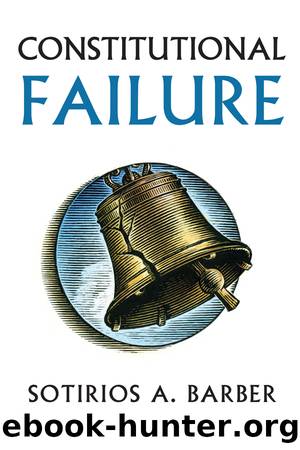Constitutional Failure by Sotirios Barber

Author:Sotirios Barber [Barber, Sotirios]
Language: eng
Format: epub
Tags: Constitutional, Constitutions, Political Science, American Government, Law, General
ISBN: 9780700620074
Google: q5fboAEACAAJ
Goodreads: 22256420
Publisher: University Press of Kansas
Published: 2014-01-15T07:42:14+00:00
Two Cases
The American founding and the Civil War are occasions of institutional breakdown followed by dramatic institutional change. The Founding involved the collapse of a confederation; the Civil War involved the collapse of a federation. The confederation failed to meet the needs of its people; the federation proved unable to maintain a united people. Yet institutional breakdown and constitutional breakdown may not be the same thing, and institutional breakdown notwithstanding, neither the Founding nor the Civil War may be a case of constitutional breakdown. Indeed, from Madisonâs account of the Founding, the Confederation might even appear as something of a success. After all, officials of the Confederation oversaw fundamental institutional reform through peaceful means, a feat the nation was not to repeat and probably wonât repeat.1 And as Lincoln saw it, the Civil War represented less a breakdown of the Constitution than the ârebirthâ of its founding principle.
True, both the Founding and the Civil War marked cases of institutional failure and extralegal, even illegal, routes to institutional change. Madison and Lincoln claimed continuity between the old and the new, and they may well have done so to give the changes they sought a veneer of legality. On the other hand, we donât have to take the claims of Madison and Lincoln as window dressing, for if our reflections on constitution logic are sound, we can and should construe Madison and Lincoln as having claimed not institutional continuity but constitutional continuity, continuity of constitutional principle. History, after all, doesnât speak for itself. To have current significance past events must be seen as âcasesâ of some presently interesting pattern of events, and transforming an event into a case of practical significance requires the eventâs refraction through a moral medium. However we might view the Founding and the Civil War in other contexts, here they can reasonably be read to show that great institutional change need not be constitutional change and that constitutional change is essentially an attitudinal affair.
Download
This site does not store any files on its server. We only index and link to content provided by other sites. Please contact the content providers to delete copyright contents if any and email us, we'll remove relevant links or contents immediately.
The Secret History by Donna Tartt(19088)
The Social Justice Warrior Handbook by Lisa De Pasquale(12190)
Thirteen Reasons Why by Jay Asher(8909)
This Is How You Lose Her by Junot Diaz(6886)
Weapons of Math Destruction by Cathy O'Neil(6279)
Zero to One by Peter Thiel(5802)
Beartown by Fredrik Backman(5754)
The Myth of the Strong Leader by Archie Brown(5507)
The Fire Next Time by James Baldwin(5444)
How Democracies Die by Steven Levitsky & Daniel Ziblatt(5218)
Promise Me, Dad by Joe Biden(5153)
Stone's Rules by Roger Stone(5087)
A Higher Loyalty: Truth, Lies, and Leadership by James Comey(4963)
100 Deadly Skills by Clint Emerson(4925)
Rise and Kill First by Ronen Bergman(4788)
Secrecy World by Jake Bernstein(4753)
The David Icke Guide to the Global Conspiracy (and how to end it) by David Icke(4718)
The Farm by Tom Rob Smith(4509)
The Doomsday Machine by Daniel Ellsberg(4490)
